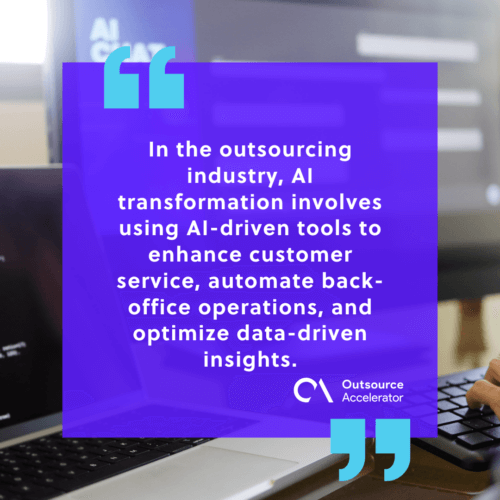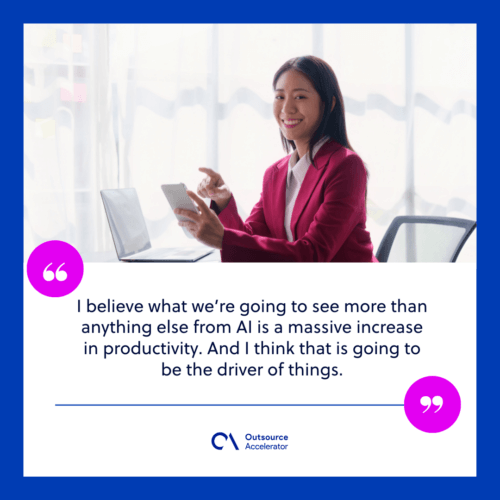Embracing AI transformation in the outsourcing industry

Artificial intelligence (AI) is reshaping industries worldwide, and outsourcing is no exception. Companies that once relied on manual processes and traditional service models are now integrating AI to enhance efficiency, accuracy, and scalability.
AI-driven transformation goes beyond automation. It’s about optimizing workflows, improving decision-making, and delivering higher-value services to clients.
As businesses seek more cost-effective and agile solutions, outsourcing providers must embrace AI transformation to remain competitive.
This shift involves leveraging AI technologies such as machine learning, natural language processing (NLP), and robotic process automation (RPA) to streamline operations and drive innovation.
In the 526th episode of the Outsource Accelerator Podcast, Brian Hunt of Kore BPO shares his thoughts on the benefit of an AI transformation. This article further explores the key aspects of AI transformation in the outsourcing sphere.
What is AI transformation?
AI transformation refers to the integration of artificial intelligence technologies into business processes. These AI tools aim to improve efficiency, decision-making, and service delivery.
In the outsourcing industry, AI transformation involves using AI-driven tools to enhance customer service, automate back-office operations, and optimize data-driven insights.
This transformation is not limited to automation alone. It extends to predictive analytics, intelligent chatbots, AI-powered quality assurance, and self-learning algorithms that continuously improve over time.
Companies that successfully undergo AI transformation can provide more value to their clients by offering smarter, faster, and more cost-effective solutions.
Brian believes that AI is “going to empower and make outsourcing even more effective.”

The key drivers of AI transformation
Several factors are accelerating AI transformation in the outsourcing industry:
Advancements in AI and machine learning
AI technologies have significantly evolved, making them more accessible and efficient. Machine learning algorithms can now process vast amounts of data, detect patterns, and make predictions with high accuracy, enabling outsourcing firms to optimize operations.
Rising demand for automation
Business process automation is a rapidly growing market, with an SNS Insider report noting it could be worth $38 billion by 2032.
Businesses are under pressure to reduce operational costs and improve efficiency, which AI transformation can assist in.
AI-driven automation helps outsourcing providers handle repetitive tasks with greater accuracy, allowing human agents to focus on high-value work.
Enhanced data processing capabilities
With the explosion of big data, outsourcing companies must process and analyze vast amounts of information quickly.
AI-powered analytics tools enable real-time decision-making and predictive insights, helping businesses stay ahead of trends.
Growing need for personalized customer experiences
Customers seek personalization as a top factor of a satisfying and retaining experience. AI-powered chatbots, virtual assistants, and NLP-driven customer support solutions allow outsourcing companies to offer highly personalized and responsive services.
Competitive pressure in the outsourcing market
Outsourcing firms must continuously innovate to stay relevant. AI transformation is becoming a key differentiator, allowing companies to offer smarter, faster, and more cost-effective solutions to clients.
Brian observes that many of the younger entrepreneurs nowadays consider AI as an integral part of their projects.
“They think, ‘What can AI do? What can we automate? And where can we build little teams to do certain aspects of the business in different parts of the world?”
5 benefits of AI transformation
Here are five benefits of introducing an AI transformation into your business:
1. Increased efficiency and cost savings
AI-driven automation eliminates repetitive and time-consuming tasks, reducing the need for manual intervention. This leads to significant cost savings for outsourcing firms while improving productivity.
While he’s not blind to the fact that certain jobs will be “made obsolete,” Brian thinks that the benefit is also something to look forward to.
“I believe what we’re going to see more than anything else is a massive increase in productivity. And I think [that] is going to be the driver of things.”

2. Enhanced accuracy and reduced errors
AI systems can process data with near-perfect accuracy, minimizing human errors in tasks like data entry, invoicing, and quality assurance. This ensures higher service reliability for clients.
3. Improved customer service and support
AI-powered chatbots and virtual assistants provide instant responses to customer inquiries, enhancing customer satisfaction.
An AI transformation can also analyze customer behavior to personalize interactions and anticipate needs.
4. Data-driven decision making
AI-driven analytics tools can process large datasets to generate valuable insights. Outsourcing firms can use these insights to optimize operations, predict trends, and make data-backed strategic decisions.
5. Scalability and flexibility
AI transformation allows outsourcing providers to scale operations efficiently without a proportional increase in workforce size.
Automated workflows enable businesses to handle increased workloads seamlessly.
Tips for successful AI transformation
Consider these tips for your own AI transformation:
1. Assess AI readiness and define clear goals
Before adopting AI, outsourcing companies must assess their current processes and identify areas where AI can bring the most value. Defining clear objectives helps ensure a smooth transition.
2. Invest in AI training and talent development
AI implementation requires skilled professionals to manage and optimize AI-driven systems.
Investing in training programs and hiring AI experts can help outsourcing firms maximize the potential of AI transformation.
3. Choose the right AI tools and technologies
Different AI solutions cater to different needs. Whether it’s RPA for automating workflows, NLP for enhancing customer interactions, or predictive analytics for data insights, choosing the right AI tools is crucial.
Brian is excited at how AI is expanding, noting “If you follow any of the AI emerging technologies, there’s just going to be so many different applications in so many different areas.”
4. Integrate AI with existing systems
AI should complement existing processes rather than replace them entirely. A seamless integration strategy ensures that AI enhances productivity without disrupting operations.
5. Monitor performance and continuously optimize
AI transformation is an ongoing process. Outsourcing firms should continuously monitor AI systems, analyze performance data, and make necessary adjustments to improve efficiency and accuracy.
AI transformation is revolutionizing the outsourcing industry, providing companies with the tools to operate smarter, faster, and more efficiently.
Brian sees it as an inevitability, saying “If you’re not building AI into almost everything that you’re doing, you’re going to be obsolete.”
By embracing AI, outsourcing firms can enhance service quality, reduce costs, and deliver greater value to clients. Implementing AI-driven solutions strategically will ensure long-term success in an increasingly competitive market.







 Independent
Independent




